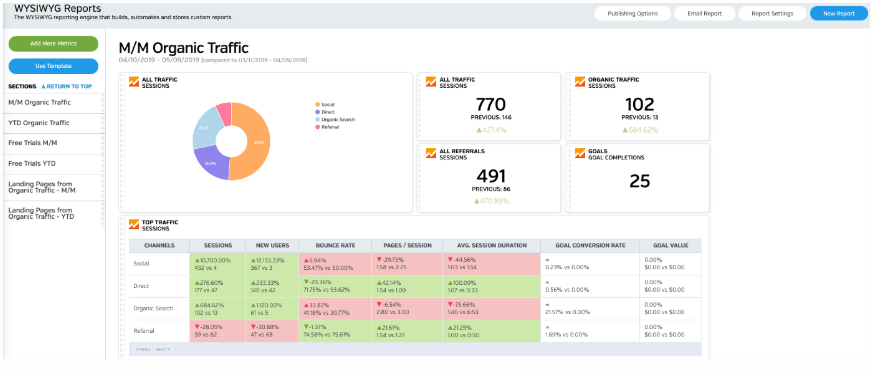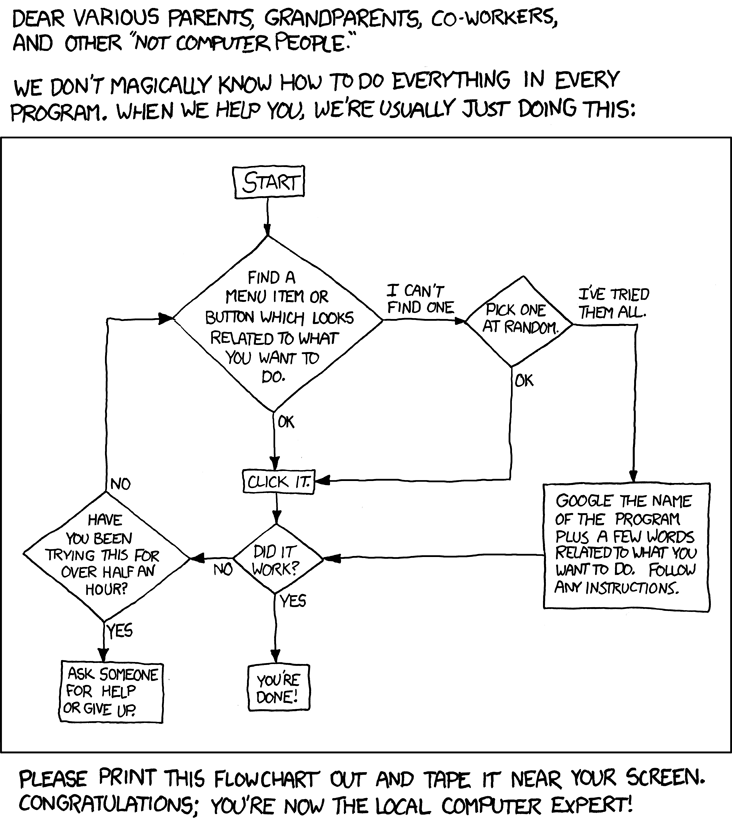If you’re reading this, you probably work in Internet marketing in some capacity.
But when you get together with family and friends, do you get asked questions about defining an audience or creating engagement?
Probably not. Since you “work with computers all day,” chances are you’re the default tech support instead – regardless of how well you actually know computers.
This raises some questions. How does the average, non-techie perceive Internet marketing? How do we get outside our bubble to relate better to them? How can we help others embrace technology without looking like complete jerks? And – most importantly – how can we use this knowledge to effectively market to non-techies?
In this post I’ll talk about perceptions of tech and non-tech people, the importance of both groups communicating with one another and some actionable marketing tips.
(If you don’t want to read these funny stories and great insights, don’t worry — you can skip to the tips at the end.)
Our Nerdy Reputation
From a young age, my family always thought I was “good with computers.” I could spend hours in front of the eternal blue of a Word Perfect screen, fighting the DOS prompt, or studiously solving the puzzles in King’s Quest VI. Later on, it included chat rooms, building terribly embarrassing Geocities pages and playing text-based RPGs.
That image still persists. When my housemates or my family need computer help, they go to me — not because I’m the most skilled, but because they perceive me as a “computer person.”
I had a feeling I wasn’t alone, so I asked a few tech professionals to tell me their stories.
Jeremy Rivera, a freelance Internet marketer and SEO based in Nashville, Tenn., earned his tech cred differently.
“The fastest way to get asked tech questions is to wear glasses, and since I have really poor eyesight, I have really thick glasses.”
Erin Everhart is the director of digital marketing at 352, a digital agency specializing in software development, UX design and digital marketing. That description alone is enough to make a non-techie’s eyes glaze over.
People started assuming she was great with computers after she started working in SEO.
“My mom kept telling everyone that I was on Facebook all day as a job. It would crack her up every time. Bless her heart,” Erin says.
Lauren Hall-Stigerts is a marketing consultant based in Seattle. She owns the site Marketing Gal and markets badass adventure games. She’s had experiences similar to Erin’s and my own.
“Translating how I make money by using tools like Facebook is an exercise in abstraction to my relatives,” she says. “Like day trading, earning an income by marketing from a 1.5-pound device anywhere in the world seems like black magic.”
The concept of explaining what we do for a living isn’t a new one, but it does loom large over our heads. Without a basic understanding of SEO, Internet marketing and social media, people who aren’t immersed in our industry are likely to assume we just get paid to use Facebook all day.
And that just exacerbates the “you work on a computer all day for a living so you must be a tech genius” stereotype.
If we dig deeper into perceptions, beyond stereotypes, what do people think of us? What do they think we do?
Default Tech Support
They don’t always know exactly what we do, but they do know we’re “good with computers.” Often, that makes us tech support by default.
Nothing explains the dichotomy between perceived techies and self-proclaimed non-techies like the act of asking for (and giving) tech support.
My housemate, for instance, can repair any big rig, tractor, piece of farm equipment, car or motorcycle under the sun. But the second his wi-fi connection goes out or he can’t connect to his printer, he immediately gives up and asks me for help.
My mom has a degree in computer programming, and she’s incredibly smart. But the second something she’s never seen before happens, she calls me up for tech support.
Lauren is no stranger to helping her family members with their computers.
“I was the go-to IT support in a family with Luddite parents,” she says. “They translated my 18-hour Internet marathons into me being a ‘computer expert.’ I’ve always been far more interested in how we communicate using the technology – the social, softer side of bits and bytes – than how the technology itself works. There was a lot of frustration between my dad and me when I was called to ‘fix the computer.’
People make assumptions that because we know one aspect of technology, we know all aspects.
Erin recently had such an experience:
“I was having lunch with my dad a couple of months ago:
Him: “Hey you work with computers.”
Me: “Something like that.”
Him: “Can you look at my iPhone and tell me why I’m not getting service?”
Me: “Dad, I don’t even have an iPhone.”
It’s like assuming I know how to fix a transmission because I drive a car.”
Steve Norell, a web developer and designer for Drake Cooper, has been a friend of mine for years.
When we’re at a bar with our friends and start talking about code, marketing and search engines, people tend to move to another table.
“I probably brought [being default tech support] upon myself by talking nerd talk,” Steve says. “I did once go out with a girl who said to me, ‘You’re not one of those computer-y guys, are you?’ ”
Bridging the Gap
Being able to explain to others what we do for a living is good for us, beyond the obvious reason that we can finally stop answering the question.
Spreading knowledge of our industry puts us all on the same playing field, even if there’s a difference in skill and interest. It gets us outside our marketing echo chamber and into conversations with the search engine users who are the end recipients of all we do. Might we even learn something from them?
“As SEOs, we know SERPs really, really well. Probably too well, actually,” Erin says. “First, we say things like ‘SERPs.’ That’s not standard. I mean, my boyfriend called it ‘The Google.’
“We think in terms of 7-pack map listings, link juice, domain authority, authorship … That is gibberish to the common person. We did some research during the summer on how real people use search engines, and it was amazing see how the other side lives because we forget that we’re not our target audience.”
Lauren explains that her breakthrough finally came from asking the right questions to start a real conversation.
” ‘OK, when you’re online, what do you do,’ ” I asked. ‘I hang out on Facebook,’ said my mother-in-law. ‘What do you do on there?’ ‘I keep up with my friends,’ she replied.
“Bingo. Keep going.
” ‘So do you like to comment on what they share? If they like something and it shows up on your page, do you like to look at it? Will you possibly ‘like’ it, too? Do you ever share the photos your friends share?’ ”
“My mother-in-law replies, ‘Oh yes, I love sharing the funny photos!’
” ‘OK then. I help companies create stuff like those images to help attract and keep customers. If you like an image a company puts out there, you’ll be likely to share it with friends. That helps spread the company’s name around, and perhaps you’ll come to love that company through the entertaining or helpful stuff they put online.’
“The look of realization and understanding on my in-laws’ faces was so rewarding. They now relate to me better and have a stronger sense of what I do.”
When we understand how the “other half” lives, we have a stronger sense of what they need. How can we use that knowledge to market to the non-techies of the world?
Marketing to Non-techies
Firstly, we can help less tech-savvy folks connect the dots. Knowledge is empowering, and once they understand something, they become more confident about it.
Regardless of technological aptitude, everyone loves learning and mastering something new.
The problem is that some people are too afraid to even approach connecting the dots.
“There’s actually a lot of fear in non-techie people when it comes to the Internet and computers in general,” Jeremy says. “A lot of self-doubt. That doubt keeps them from thinking they can possibly keep up with technology and puts them even further behind as they throw up their hands and ask the nearest guy with glasses to ‘just fix it.’ ”
If you talk down to them, you’re doing both of you a disservice. When you market to less tech-savvy people, it’s important to strike the right tone by avoiding jargon and sticking to a straightforward solution – without “dumbing it down” or being condescending.
Think about how Macintosh’s entire user experience – iPhones and iPads are geared to be highly visual, intuitive and marketed to a less tech-savvy audience while not sacrificing quality or capability.
Steve thinks education is the key.
“Techie types tend to want to just jump in and fix the problem, without helping the user understand what happened or how to resolve it in the future. It’s easier. But that adds more fear of technology, which adds more panic at the next crisis. Teach a user to fish.”
That advice goes both ways. How we search for things is immaterial. We need to understand what the average user wants and how they search for things.
“The more we start thinking about how people actually use search engines, the better we can provide our results for them,” Erin says. “Like knowing that people need reassurance from reviews or their peers before purchasing. Or that people like to search for the ‘best’ of something when it’s a personal and impactful purchase to their lives. Those are things that we can leverage when we’re helping our clients.”
My housemate, for instance, might search for “best ammo boise” when he’s looking for hunting rifle rounds. The top result for that search is Boise Gun Co., and that’s the place he’s likely to go. No ifs, ands or buts.
If I had Boise Gun Co. as a client (I don’t, by the way, but they are super nice folks) I’d need to convey to them how people search for them and why ranking for that search is important. But how do we get there?
How do we get them to ask those questions?
“Overwhelming them with details won’t help tell (and sell) the story,” Lauren says. “I let them drive the pace of learning. Next time I see them, I will share additional details based on their experiences…Non-techie customers want a short, easy, and understandable path to their solution. Avoid overwhelming them with extraneous messaging and earn a happy customer.”
Everyone in this article, me included, has been conditioning themselves since before puberty to understand and use technology. But we don’t represent the entire population, which is why it’s important to communicate with average users.
Their questions help us understand what our non-techie peers want. We need to cut the crap and make them feel empowered.
The Promised tl;dr
1. Understand what your potential customer wants from your technology-based service. How can you make them feel comfortable with the technological divide? How do they search for what they want? What influences them to convert? Hint: it’s both the same as and different than what influences you to convert.
2. Help the average customer connect the dots. How does your product or service directly affect their lives? Education is the key, and so is telling the truth. They can smell our geeky pandering from a mile away. They need to understand, clearly and without jargon, what we do and how we can help.
3. Never condescend. These people know things that we don’t — they’re not unintelligent. They just don’t live in our world. Keep that in mind because it’s easy to talk down to someone who isn’t on the same page as you.
4. Empower the non-techie to approach technology with a problem-solving mindset. Your product or service is often part of the problem solving process. They need to ask questions and connect those dots.
5. Tell a story. Ask questions. Keep them engaged.
6. Create an easy path. Help them get to their solution with the least amount of resistance. Don’t overload them with stuff they don’t care about. Don’t tell them why your service or product is great; tell them how it helps them.

White Labeled and Branded Reports. Drag and Drop Editor. Automate your SEO, PPC, Social, Email, and Call Tracking Reporting.










